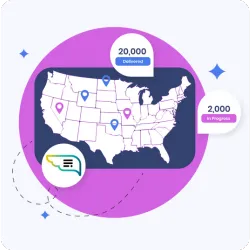Rated 4.9 stars on
Google Reviews
Table of Contents
If your business sends SMS messages to customers, whether it's appointment reminders, order updates, or marketing offers, you might think you're doing everything right by collecting consent and sticking to a compliant SMS opt-out process. But there’s one critical step many businesses miss: checking if a phone number has been reassigned.
This is where the Reassigned Numbers Database (RND) comes in.
If you’ve never heard of the RND before, you’re not alone, but ignoring it could cost your business more than just a few frustrated customers. It could lead to regulatory fines, carrier complaints, or worse, a TCPA violation. Let’s break it all down.
What Is the Reassigned Numbers Database (RND)?
The Reassigned Numbers Database (RND) is a database managed by the U.S. Federal Communications Commission (FCC). The RND was officially launched by the Federal Communications Commission (FCC) on November 1, 2021. It contains numbers that have been permanently disconnected from one user and reassigned to someone else. Why does this matter? Because under the Telephone Consumer Protection Act (TCPA), you must have a person’s consent before sending them marketing or automated messages. If a number has been reassigned and you message the new owner, you no longer have that consent, even if you did originally.
Keen to learn more? Watch this video on the launch of the Reassigned Number Database produced by the FCC.
Why is The RND Critical for SMS Compliance?
Let’s say you collected SMS opt-in consent from a customer in 2023. Since then, that customer disconnected their number. Now in 2025, you send them a promotional SMS. Except it doesn’t go to them, it goes to the new person who now owns the number. That new person never gave you permission.
Since 82% of consumers read their text messages within five minutes of receiving them, any misdirected message will be seen almost instantly, meaning there’s no time to quietly correct the error before it causes damage. That mistake could lead to a complaint, a regulatory fine, or lasting harm to your sender reputation.
If they file a complaint or report your message as spam, you could face:
- Legal penalties under the TCPA
- Carrier filtering or campaign suspension
- Damage to your sender reputation
- Loss of customer trust
So, even with consent, you must make sure the number still belongs to the person who gave it to you.
Common Business Risks
Here are some common situations where businesses face risks by not using the RND.
Healthcare
A medical practice sends appointment reminders. A patient changes numbers, and their old number is reassigned. The new owner receives a sensitive health-related message. This could trigger a HIPAA or TCPA violation - a risk that can be reduced by using a HIPAA compliant texting app alongside the Reassigned Numbers Database.
Retail & E-commerce
You run an online store and send SMS promotions. A former customer’s number is reassigned. The new recipient files a complaint for unsolicited marketing.
Financial Services
Your bank or lending firm sends alerts or two-factor authentication codes. These could reach unintended recipients, creating security concerns and compliance risks.
SaaS or Communication Platforms
You provide SMS services on behalf of clients. If you're sending high volumes, RND checks help reduce opt-outs and maintain carrier compliance.
How Does the Reassigned Number Database Work?
Using the Reassigned Number Database is simple once you register:
Step 1: Register as a Qualified Caller
Visit the official RND website and sign up as a Qualified Caller. You’ll need to provide your business details and agree to the terms of use.
Step 2: Prepare Your Data
To run a query, you’ll need:
- The phone number you want to check
- The date of consent you originally collected from the recipient
The date of the query
Step 3: Submit a Query
You can manually enter numbers or use a batch process (CSV upload) if you’re checking many numbers at once.
The RND will return one of three responses:
- Yes – The number has been reassigned since the consent date.
- No – The number has not been reassigned.
No Data – The database doesn't have information on that number yet.
Step 4: Take Action
- If the response is “Yes”, do not send the message. You no longer have valid consent.
- If “No”, you’re safe to proceed.
- If “No Data”, use caution and consider verifying the contact another way.
| Best Practice | Why It Matters |
|---|---|
| Get documented consent | Required under TCPA |
| Track opt-in date | Needed for RND queries |
| Use the RND for contacts | Prevent messages to reassigned numbers |
| Regularly clean your lists | Avoid bouncebacks and outdated contacts |
| Respect opt-outs | Stay compliant and build trust |
Is the RND Mandatory?
Currently, using the RND is optional, but it acts as a safe harbour under the TCPA. That means if you query the RND and receive a “No”, you're protected from liability in the event of a mistaken message. So while it’s not yet mandatory, it’s highly recommended for any business sending automated or high-volume SMS messages in the U.S.
Avoid Fines with the Reassigned Number Database
Under the Telephone Consumer Protection Act (TCPA), businesses that send SMS messages without proper consent can face significant financial penalties. Each unauthorized message can result in fines of up to $500, and this amount can increase to $1,500 per message if the violation is found to be willful or knowing. These fines can accumulate rapidly; for instance, a campaign that inadvertently sends messages to 10,000 individuals without proper consent could lead to fines ranging from $5 million to $15 million.
To mitigate these risks, the Federal Communications Commission (FCC) has established the Reassigned Numbers Database (RND). This database allows businesses to verify whether a phone number has been reassigned to a new user since the original consent was obtained. By checking the RND before sending messages, businesses can avoid contacting individuals who have not provided consent, thereby reducing the likelihood of incurring TCPA violations.
How Much Does it Cost to use the Reassigned Number Database
The RND operates on a subscription-based model, with pricing tiers based on the volume of queries a business anticipates making. As of April 28, 2025, the FCC implemented a 20% reduction in pricing across all subscription tiers and introduced two new tiers to better accommodate varying business needs.
For example, smaller businesses can expect to pay approximately $0.01 per query, while larger enterprises with higher query volumes may benefit from bulk pricing discounts.
Combine RND with Notifyre Features
While Notifyre doesn’t yet integrate directly with the RND, we support best practices that reduce your risk:
- Automatic opt-out management (For "STOP” and "UNSUBSCRIBE" replies)
- SMS activity logs to monitor engagement and delivery
If you're sending to U.S. recipients regularly, it is always recommend to combine Notifyre’s tools with periodic RND checks, especially for older contact lists.
Start Using The Reassigned Numbers Database
If you’re sending SMS to customers, the Reassigned Numbers Database is a critical layer of protection. It’s not just about avoiding fines, it’s about respecting your audience and ensuring your message lands where it should.
Think of the RND as insurance for your SMS campaigns: it costs little, but it could save you a lot.
10DLC Registration
Everything you need to know about 10DLC compliance to meet SMS industry regulations in the United States.
 10DLC Registration Guide
10DLC Registration Guide Big Impact, Low Cost with Online SMS
Get unbeatable value with Notifyre’s pay-as-you-go SMS. Send smarter, save more!
 Online SMS Service
Online SMS Service 


Secure, safeguarded SMS and fax service
Our SMS and fax gateway is compliant with privacy laws, ensuring your business data stays secure. Notifyre’s secure messaging tools keeps your online fax secure and SMS data protected at all times.